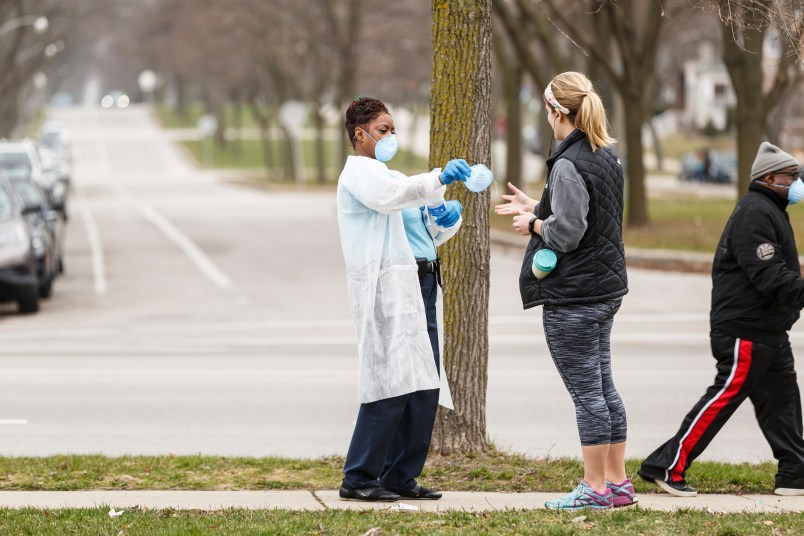The Milwaukee Health Department has found seven cases of coronavirus likely linked to the election two weeks ago.
“We are also looking at any new cases that began after 4/7 as the incubation period is 14 days (ends tomorrow, 4/21),” department communications director Shawn Benjamin told TPM.
He added that the department only has 30% of the data that it hopes to collect. His team is planning to release a full report on Friday. Next week, he said, the department hopes to have a more “comprehensive county update.”
“Some reasons for this may be the patient declined to provide the info, a lab delay in processing which delays the report to health department & slows investigation, and/or the patient just presented symptoms therefore they were recently tested and just entered our system,” said Commissioner of Health Jeanette Kowalik of the delay.
The voters were found through the Wisconsin Electronic Disease Surveillance System, which the state Health Department beefed up with 120 additional contact tracers just after the election.
The system allows interviewers to track down people with the virus and keep tabs on all the people they had contact with. A field was added for the officials to note whether or not the respondent worked the polls or voted in person on election day.
Milwaukee in particular saw a drastic dip in polling places as scores of election workers called out sick, or afraid-to-become sick. The city only offered five polling places on April 7 — down from its usual 180.
The condensed polling options forced long lines and excessive person-to-person contact as voters crammed into the limited spaces.
Elsewhere in Wisconsin, counties are not reporting a similar spike in cases to Milwaukee. Though given the time since the election, the lack of testing and difficulty in pinpointing the origin of transmission, election-related cases may still be going undetected.
“Our health departments have not reported a similar batch of election-related cases like Milwaukee,” Mark Schaaf, communications director for Racine County, told TPM. “That said, I would expect we would have more conclusive data on this in the next week/10 days.”
He added that cases in the 196,311-person county are still rising, though numbers would be “much worse” without the social distancing efforts currently in effect.
Racine County, the fifth most populous in Wisconsin, didn’t see its polling options decimated like Milwaukee, though all 14 sites had in-person voting and risk of transmission.
Brown County, home to Green Bay and slightly more populous than Racine, has not “at this time identified a correlation with confirmed case increases and the recent in-person election,” said Ted Shove, public information officer for the county’s COVID command. The county currently has 285 cases, per the state health department.
Carlo Nevicosi, director of the Heath and Human Services Department in Walworth county, south of Milwaukee, told TPM that he doesn’t think his department could link recent increases in his county to “in-person voting vs. a grocery store vs. any other public interaction.”
Jeff Kindai, a health department officer in Grant County on the Iowa-Wisconsin border, said that he is not aware of cases that can be “definitively linked” to the election at this point. He added to TPM that “many if not most people with COVID 19 like symptoms are not being tested due to capacity and PPE issues so cases are very likely to be missed anyway.”
The statewide in-person election at the beginning of the month only proceeded due to a double-team effort from state Republican lawmakers and GOP judges. Gov. Tony Evers (D) and the Democrats tried to get the in-person voting delayed until the pandemic had weakened, but Republicans immediately mounted a challenge to Evers’ executive order.
The state Supreme Court, voting remotely, upheld the GOP challenge and mandated that in-person voting be held as planned. In an adjacent decision, the U.S. Supreme Court curtailed the window in which voters could return their absentee ballots.
Though common wisdom held that Republicans were expending so much effort to keep the in-person election as scheduled to dampen turnout and boost the chances of incumbent state Supreme Court justice Daniel Kelly winning reelection, his liberal challenger, Jill Karofsky, triumphed.
In her victory message, she condemned those who forced the dangerous voting situation.
“Although we were successful in this race, the circumstances under which this election was conducted were simply unacceptable, and raise serious concerns for future of our democracy,” she said. “Nobody in this state or in this country should be forced to to choose between their safety and participating in an election.”



